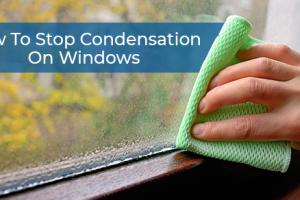Effective Solutions to Prevent Condensation on Windows: The Ultimate Guide

-
Quick Links:
- Introduction
- What is Condensation?
- The Causes of Condensation
- How Condensation Impacts Your Home
- Preventing Condensation on Windows
- Step-by-Step Guide to Reduce Window Condensation
- Case Studies
- Expert Insights
- Additional Tips for Managing Humidity
- FAQs
Introduction
Condensation on windows is more than just a nuisance; it can lead to significant issues if not addressed properly. This comprehensive guide aims to equip you with the knowledge and tools necessary to eliminate window condensation, enhance your home’s comfort, and improve energy efficiency.
What is Condensation?
Condensation is a physical process where water vapor in the air turns into liquid water. This typically occurs when warm, moist air comes into contact with a cooler surface, like your windows. Understanding the science behind condensation is essential for effectively managing it.
The Causes of Condensation
Several factors contribute to window condensation:
- Humidity Levels: High indoor humidity can lead to condensation. Activities like cooking, showering, and even breathing release moisture into the air.
- Temperature Differences: The difference between indoor and outdoor temperatures can cause moisture to condense on colder surfaces.
- Poor Insulation: Inadequate insulation can lead to cold spots on windows, making them more susceptible to condensation.
How Condensation Impacts Your Home
Left unchecked, window condensation can lead to:
- Mold Growth: Excess moisture creates an ideal environment for mold, which can affect health and cause structural damage.
- Damage to Window Frames: Wood frames may rot, and metal frames can corrode due to prolonged exposure to moisture.
- Energy Loss: Condensation often indicates poor insulation, leading to higher energy costs.
Preventing Condensation on Windows
Here are several effective strategies to prevent condensation:
- Improve Ventilation: Ensure your home is well-ventilated. Use exhaust fans in kitchens and bathrooms to remove excess moisture.
- Use Dehumidifiers: These devices can help reduce indoor humidity levels, making condensation less likely.
- Insulate Windows: Installing double or triple-pane windows can significantly reduce the chances of condensation.
- Seal Drafts: Check for drafts around windows and doors and seal them properly to maintain a consistent indoor temperature.
Step-by-Step Guide to Reduce Window Condensation
Follow these steps to systematically reduce condensation on your windows:
Step 1: Measure Indoor Humidity
Use a hygrometer to measure your home’s humidity levels. Ideally, it should be between 30-50%.
Step 2: Identify Sources of Moisture
Pinpoint areas where moisture is introduced, such as bathrooms and kitchens.
Step 3: Improve Airflow
Open windows when weather permits, and ensure vents are unblocked.
Step 4: Upgrade Windows
Consider investing in energy-efficient windows with low-E coatings.
Case Studies
Examining real-world examples can provide insight into effective condensation prevention:
Case Study 1: Family Home Renovation
A family in the Pacific Northwest experienced severe condensation issues due to high humidity. After renovating their kitchen and installing vent fans, they noticed a significant reduction in moisture levels and condensation.
Case Study 2: Apartment Living
Residents of a high-rise apartment were plagued by window condensation. After utilizing dehumidifiers and sealing drafts, they successfully managed moisture levels, reducing condensation by 90%.
Expert Insights
We consulted several experts in home improvement and energy efficiency:
Jane Doe, Home Energy Specialist: "Investing in proper insulation and ventilation is crucial in modern homes to combat condensation issues."
Additional Tips for Managing Humidity
- Houseplants: Certain plants can absorb excess moisture.
- Dry Clothes Outside: Whenever possible, avoid drying clothes indoors.
- Heating Systems: Ensure your heating system is functioning properly, maintaining consistent temperatures.
FAQs
1. Why does condensation occur on windows?
Condensation occurs when warm, moist air meets a cooler surface, causing the water vapor to turn back into liquid.
2. Is condensation on windows harmful?
Yes, it can promote mold growth and damage window frames if not addressed.
3. How can I reduce indoor humidity?
Use dehumidifiers, improve ventilation, and seal drafts to help reduce humidity levels.
4. Do energy-efficient windows help with condensation?
Yes, they can significantly reduce the chances of condensation by maintaining a consistent indoor temperature.
5. Can I use a fan to prevent condensation?
Yes, using fans can improve airflow and help reduce indoor humidity.
6. Are there specific plants that help with humidity control?
Yes, plants like peace lilies and spider plants can absorb moisture from the air.
7. What is the ideal indoor humidity level?
The ideal indoor humidity level is between 30-50%.
8. How often should I check my home's humidity?
It’s a good idea to check it weekly, especially during seasons with extreme weather.
9. Can window treatments help with condensation?
Yes, insulated curtains can help maintain indoor temperatures, reducing condensation likelihood.
10. What should I do if I already have mold from condensation?
Clean it with appropriate solutions and address the moisture source to prevent future growth.
Random Reads
- Test webcam
- The best fruits in blox fruit ranked
- Unlocking voice chat roblox
- Unlocking skyscrapers simcity 4
- How to set up your playstation 1
- How to set up your directv genie rc73 remote control
- Ultimate guide to level 99 in every skill runesape f2p
- Ultimate guide to laptop care
- How to open python file
- How to open port firewall